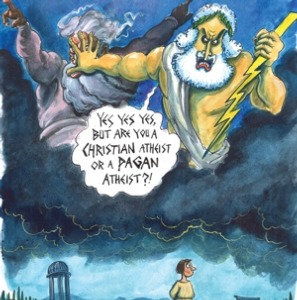
What is humanism for? The reason I ask is that, reading the reports this morning on David Cameron making the case for updating Britain's nuclear arsenal, I found myself wondering whether humanists should be campaigning against it.
To me, it seems obvious. If humanists are committed to "finding meaning, beauty and joy in the one life we have", and basing "their moral principles on reason, ... on shared human values and respect for others" (to quote a couple of lines from the British Humanist Association's website), then surely we should be against the possession of weapons which provide the potential for the murder of millions, if not billions, of people and the destruction of the one planet we're able to call home. In my opinion, if we want to promote the positive, rational use of scientific knowledge then a prerequisite should be a commitment to nuclear disarmament. And this is without even mentioning the money we'd save.
We'd be following a fine tradition too. The Campaign for Nuclear Disarmament always had a strong Christian wing, but humanists were there in its heyday in the late 1950s and early 1960s too. Albert Einstein (once a member of our own organisation) was famously horrified by the Bomb, while the CND's first President was Bertrand Russell, who had realised the danger posed to the world as soon as the atomic bombs were dropped on Japan in 1945. "Mankind are faced with a clear-cut alternative," wrote Russell following the Nagasaki attack. "Either we shall all perish, or we shall have to acquire some slight degree of common sense." Surely that's a sentiment today's humanists should be looking to rediscover?
But, having said all that, no doubt there are large numbers of humanists who would completely disagree with me. Many, I'm sure, would make the same arguments as David Cameron in the Telegraph today, pointing out that Britain's nuclear weapons are a vital deterrent in a world in which nuclear proliferation represents a growing threat. Some, perhaps, would suggest that my advocacy of nuclear disarmament has little to do with humanism and rationalism, representing instead a leftist inability to analyse the world with realistic common sense.
Which brings me back to my initial question: what is humanism for? Of course, the humanism we're discussing here (as opposed to religious humanist traditions) has one unifying idea running through it, which is not believing in God(s), but what does it stand for beyond that? There's the notion of living a good life without such Gods, but that's a somewhat broad, though entirely laudable, commitment. What are the specific issues on which humanists campaign, or, to put it another way, what constitutes humanist politics?
Obviously, there are numerous specifically religion-related issues – in Britain, humanists tend to oppose, among other things, the state-funding of religious schools, the position of Bishops in the House of Lords, and disproportionate religious influence over issues such as assisted dying, while campaigning internationally on issues relating to freedom of conscience and belief. All important subjects, but only occasionally will humanist campaigns cross over with the major political issues of the moment – it would be hard for instance, to say how organised humanism has responded to the economic crisis, but you wouldn't have much trouble finding examples of how leading Church figures have responded.
Perhaps humanism is too broad to have a politics at all. Unlike plain atheism, humanism makes an ethical claim about living a good life without God, but humanists do not necessarily agree on how that good life ought to be lived. If you polled British humanists, it is unlikely that you would find much consensus on how we should react to specific issues, whether they concern the continuing existence of nuclear weapons or how best to bring about global economic recovery. One person's good life without God could be another's very bad life without God.
But where does that leave it as a movement? If there is no realistic chance of humanists reaching a consensus on the big political issues, can organised humanism become anything more than an interest group for people who don't believe in God?
Looking at it this way, humanism begins to look essentially conservative in character. While humanists in Britain are often seen as falling on the left politically (see Polly Toybee's recent piece in the Guardian), humanism itself poses little challenge to the political consensus of the day – beyond a few minor tweaks to the position of religion in politics and society, organised humanism has no real problem with the political status quo.
So is it time for humanists to get political? I'd certainly like to see us branching out beyond the standard traditional church/state issues, and I think a cause like nuclear disarmament would be a good place to start.
What do you think? As those of you who have signed up as founder members of our online community will know, we're looking to start a debate over the direction the 21st century Rationalist Association ought to take – politics surely needs to come into this debate, so please do share your thoughts below.

